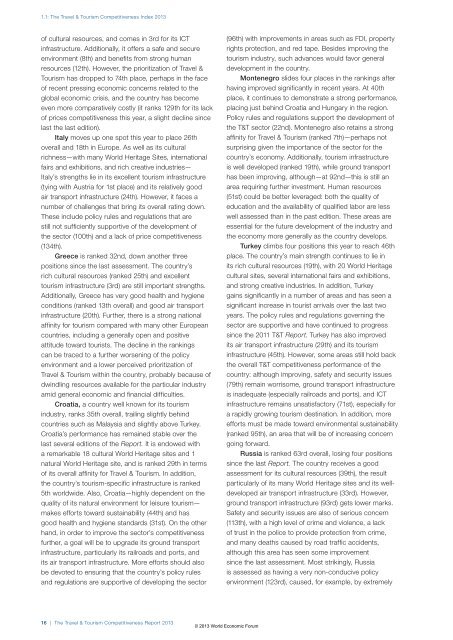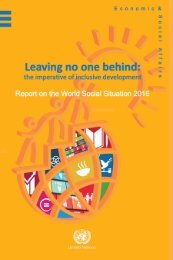The Travel & Tourism Competitiveness Report 2013
The Travel & Tourism Competitiveness Report 2013
The Travel & Tourism Competitiveness Report 2013
Create successful ePaper yourself
Turn your PDF publications into a flip-book with our unique Google optimized e-Paper software.
1.1: <strong>The</strong> <strong>Travel</strong> & <strong>Tourism</strong> <strong>Competitiveness</strong> Index <strong>2013</strong><br />
of cultural resources, and comes in 3rd for its ICT<br />
infrastructure. Additionally, it offers a safe and secure<br />
environment (8th) and benefits from strong human<br />
resources (12th). However, the prioritization of <strong>Travel</strong> &<br />
<strong>Tourism</strong> has dropped to 74th place, perhaps in the face<br />
of recent pressing economic concerns related to the<br />
global economic crisis, and the country has become<br />
even more comparatively costly (it ranks 129th for its lack<br />
of prices competitiveness this year, a slight decline since<br />
last the last edition).<br />
Italy moves up one spot this year to place 26th<br />
overall and 18th in Europe. As well as its cultural<br />
richness—with many World Heritage Sites, international<br />
fairs and exhibitions, and rich creative industries—<br />
Italy’s strengths lie in its excellent tourism infrastructure<br />
(tying with Austria for 1st place) and its relatively good<br />
air transport infrastructure (24th). However, it faces a<br />
number of challenges that bring its overall rating down.<br />
<strong>The</strong>se include policy rules and regulations that are<br />
still not sufficiently supportive of the development of<br />
the sector (100th) and a lack of price competitiveness<br />
(134th).<br />
Greece is ranked 32nd, down another three<br />
positions since the last assessment. <strong>The</strong> country’s<br />
rich cultural resources (ranked 25th) and excellent<br />
tourism infrastructure (3rd) are still important strengths.<br />
Additionally, Greece has very good health and hygiene<br />
conditions (ranked 13th overall) and good air transport<br />
infrastructure (20th). Further, there is a strong national<br />
affinity for tourism compared with many other European<br />
countries, including a generally open and positive<br />
attitude toward tourists. <strong>The</strong> decline in the rankings<br />
can be traced to a further worsening of the policy<br />
environment and a lower perceived prioritization of<br />
<strong>Travel</strong> & <strong>Tourism</strong> within the country, probably because of<br />
dwindling resources available for the particular industry<br />
amid general economic and financial difficulties.<br />
Croatia, a country well known for its tourism<br />
industry, ranks 35th overall, trailing slightly behind<br />
countries such as Malaysia and slightly above Turkey.<br />
Croatia’s performance has remained stable over the<br />
last several editions of the <strong>Report</strong>. It is endowed with<br />
a remarkable 18 cultural World Heritage sites and 1<br />
natural World Heritage site, and is ranked 29th in terms<br />
of its overall affinity for <strong>Travel</strong> & <strong>Tourism</strong>. In addition,<br />
the country’s tourism-specific infrastructure is ranked<br />
5th worldwide. Also, Croatia—highly dependent on the<br />
quality of its natural environment for leisure tourism—<br />
makes efforts toward sustainability (44th) and has<br />
good health and hygiene standards (31st). On the other<br />
hand, in order to improve the sector’s competitiveness<br />
further, a goal will be to upgrade its ground transport<br />
infrastructure, particularly its railroads and ports, and<br />
its air transport infrastructure. More efforts should also<br />
be devoted to ensuring that the country’s policy rules<br />
and regulations are supportive of developing the sector<br />
16 | <strong>The</strong> <strong>Travel</strong> & <strong>Tourism</strong> <strong>Competitiveness</strong> <strong>Report</strong> <strong>2013</strong><br />
(96th) with improvements in areas such as FDI, property<br />
rights protection, and red tape. Besides improving the<br />
tourism industry, such advances would favor general<br />
development in the country.<br />
Montenegro slides four places in the rankings after<br />
having improved significantly in recent years. At 40th<br />
place, it continues to demonstrate a strong performance,<br />
placing just behind Croatia and Hungary in the region.<br />
Policy rules and regulations support the development of<br />
the T&T sector (22nd). Montenegro also retains a strong<br />
affinity for <strong>Travel</strong> & <strong>Tourism</strong> (ranked 7th)—perhaps not<br />
surprising given the importance of the sector for the<br />
country’s economy. Additionally, tourism infrastructure<br />
is well developed (ranked 19th), while ground transport<br />
has been improving, although—at 92nd—this is still an<br />
area requiring further investment. Human resources<br />
(51st) could be better leveraged: both the quality of<br />
education and the availability of qualified labor are less<br />
well assessed than in the past edition. <strong>The</strong>se areas are<br />
essential for the future development of the industry and<br />
the economy more generally as the country develops.<br />
Turkey climbs four positions this year to reach 46th<br />
place. <strong>The</strong> country’s main strength continues to lie in<br />
its rich cultural resources (19th), with 20 World Heritage<br />
cultural sites, several international fairs and exhibitions,<br />
and strong creative industries. In addition, Turkey<br />
gains significantly in a number of areas and has seen a<br />
significant increase in tourist arrivals over the last two<br />
years. <strong>The</strong> policy rules and regulations governing the<br />
sector are supportive and have continued to progress<br />
since the 2011 T&T <strong>Report</strong>. Turkey has also improved<br />
its air transport infrastructure (29th) and its tourism<br />
infrastructure (45th). However, some areas still hold back<br />
the overall T&T competitiveness performance of the<br />
country: although improving, safety and security issues<br />
(79th) remain worrisome, ground transport infrastructure<br />
is inadequate (especially railroads and ports), and ICT<br />
infrastructure remains unsatisfactory (71st), especially for<br />
a rapidly growing tourism destination. In addition, more<br />
efforts must be made toward environmental sustainability<br />
(ranked 95th), an area that will be of increasing concern<br />
going forward.<br />
Russia is ranked 63rd overall, losing four positions<br />
since the last <strong>Report</strong>. <strong>The</strong> country receives a good<br />
assessment for its cultural resources (39th), the result<br />
particularly of its many World Heritage sites and its welldeveloped<br />
air transport infrastructure (33rd). However,<br />
ground transport infrastructure (93rd) gets lower marks.<br />
Safety and security issues are also of serious concern<br />
(113th), with a high level of crime and violence, a lack<br />
of trust in the police to provide protection from crime,<br />
and many deaths caused by road traffic accidents,<br />
although this area has seen some improvement<br />
since the last assessment. Most strikingly, Russia<br />
is assessed as having a very non-conducive policy<br />
environment (123rd), caused, for example, by extremely<br />
© <strong>2013</strong> World Economic Forum

















